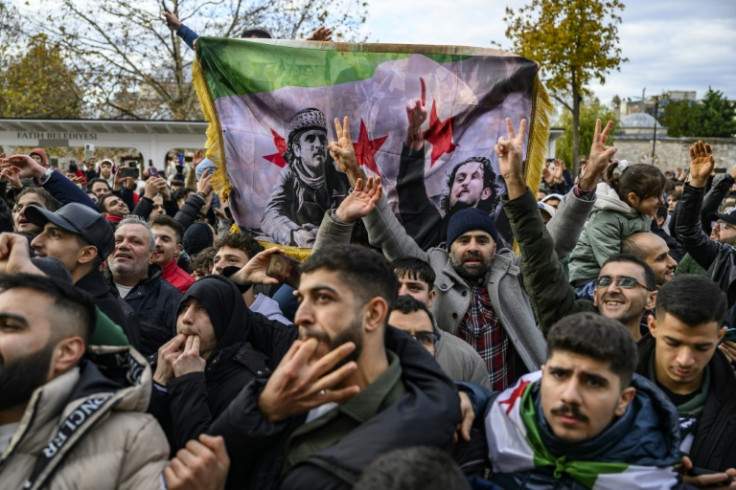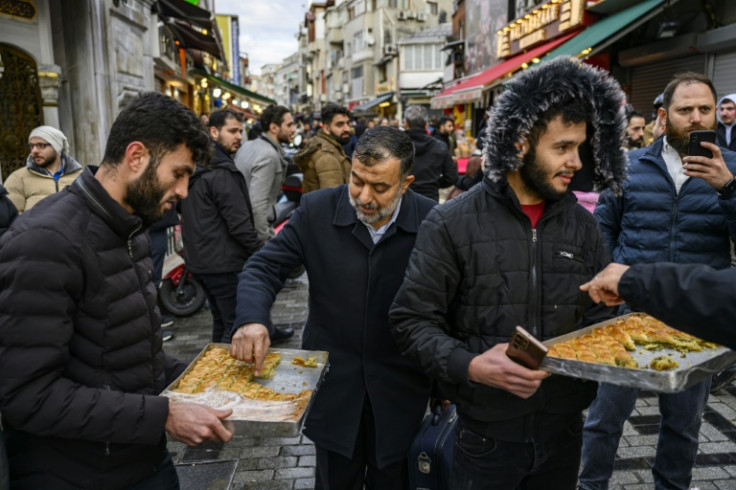Turkey's Syrians Rejoice Over Assad's Fall

Thousands of Syrians in exile the length and breadth of Turkey celebrated the fall of long-time ruler Bashar al-Assad in joyous scenes on Sunday.
Turkey has become home for millions of Syrians who fled since civil war erupted in their home nation in 2011.
Outside the Fatih Mosque in central Istanbul, one of the focal points for the city's 500,000-strong Syrian community, Mohamad Cuma said "no one was expecting" Assad's defeat.
"I didn't expect it to happen one day, not even in three centuries," said Cuma, a student who arrived from the northern Syrian city of Aleppo three years ago.
"It's incredible. It's like we've been born again," said Sawsan al-Ahmad, holding her young son by the hand.
Ahmad lived through the first few months of the siege of the strategic city of Homs.
She said she was delighted to be able to take her son to her "home soil", now that Assad has fallen after a lightning offensive by Islamist-led rebels.
Rebel group Hayat Tahrir al-Sham and allied factions seized swathes of Syria from government hands, including the cities of Aleppo, Hama and Homs in an offensive that started November 27.
Early on Sunday they entered the capital, Damascus, declaring the demise of an Assad dynasty that had ruled Syria with an iron fist for five decades.
Behind Ahmad in Istanbul, hundreds of Syrians chanted "Allahu akhbar" ("God is greatest").
Some waved Syrian opposition flags and called for Assad to be executed.
In the middle of the jubilant throng, whose chanting could be heard hundreds of metres (yards) away, a man waved a portrait of Abdel-Basset al-Sarout, a former Syrian football star who became a rebel fighter and was killed in 2019 in clashes with Assad's forces.
Many of the three million Syrian refugees who came to Turkey fleeing Assad's rule arrived in Gaziantep, a city in the southeast where nearly a quarter of its two million people are Syrian.
"If I had the chance, I'd strangle him with my bare hands!" roared Omer Hannas, the blare of roaring motorcycles, firecrackers and jammed horns in the background.
"It was Assad who forced us into exile. But he fled to Russia," the 19-year-old lamented, surrounded by friends taking in the party atmosphere.
Like other Syrians in Gaziantep, Hannas had grown up just two hours' drive from his homeland but was unable to set foot there, so Turkey became his "other country".
At the nearest border crossing to Gaziantep, queues of cars poured through on Sunday morning to cross into Syria, a group of young people who went to "smell the air" across the border said.
But that flow had dried up by the early afternoon, an AFP journalist saw.
"We're so happy: we've been saved from Assad! I wish all dictators could suffer the same fate," smiled Medjit Zein, 40, who said he planned to return to Aleppo from Gaziantep in a month or so once the situation "stabilises".
Others were more reluctant to give up the lives they had built here in Turkey.
"I've forgotten Aleppo," admitted Ahmed Abou Kadiro.
Having arrived here in 2016 aged nine, the 17-year-old said he struggles to imagine the "paradise" the others were celebrating with fevered passion.
"But I still have family there that I'd like to see."
Lamis, in her 40s and wearing a headscarf, was grateful for the Turkish welcome, but still yearned to return to Syria.
She had come to Gaziantep from the town of Hama, scene of a massacre orchestrated in 1982 by the forces of Bashar's father Hafez al-Assad.
Life under the son was little better: Bashar al-Assad sent her father, grandfather and younger sister to prison for eight years.
"We have suffered from the Assad family for 50 years," Lamis said.
"I want to thank (Turkish President) Erdogan and Turkey, but here I miss everything from Syria... Everything."
Back in Istanbul, 42-year-old Ibrahim al-Mohamed called Sunday "a day of huge celebration for us Syrians".
"My son became handicapped because of Assad," he said, his eyes red and his voice cracking with emotion.
"We were living in Aleppo and a bomb was dropped on the building next door. My son was traumatised. He lost the ability to speak. He's 13 now and just starting to get a little bit better."
"If God wills, (Assad) will be decapitated," added an onlooker, drawing his thumb across his throat.
Cuma said he expected the whole of Syria would "be unified under one flag" and predicted 50 percent of Syrian refugees in Turkey would return home.
He said the reported fall of the Assad regime had altered his personal plans.
"Well, my plan before this week was to pursue a Masters (degree) in the UK," explained the civil engineering student at Istanbul's prestigious Bogazici University.
"But now I think I could be a benefit for Syria's future and reconstruction. So most probably I'll go back."





© Copyright AFP 2024. All rights reserved.





















